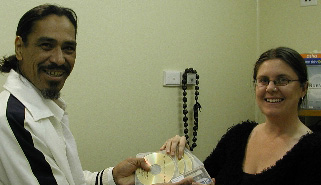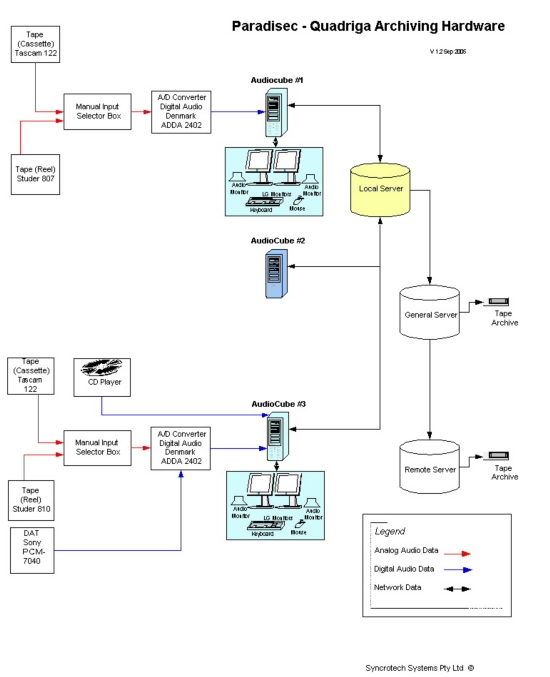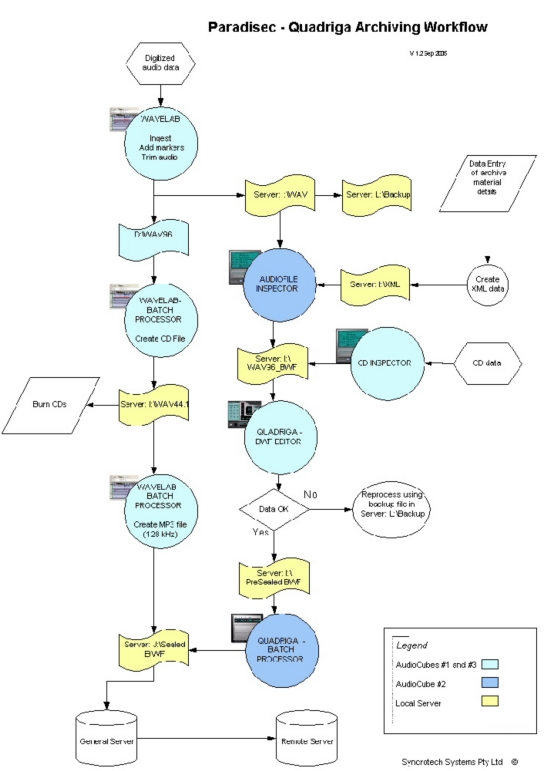Please note that the PARADISEC website has been redesigned.
The new website can be found at http://www.paradisec.org.au/
SERVICES
PARADISEC offers a number of services for cost recovery fees, including digitisation of audio material and training in ethnographic documentation techniques of recording, data management, and data linkage.
 |
Training Workshops are also available. Topics covered include:
- use and comparative advantages of different types of recording equipment;
- lexicographic software;
- transcription and interlinearising of texts;
- linkage of digitised audio and transcripts;
- managing information as it is collected to facilitate later access;
- assessment and cataloguing of data collections.
Data and Equipment
Data Preservation
Recorded material needs to be preserved in a way that allows it to be read into the future. Reel to reel and cassette tapes are becoming obsolete and playing them is becoming more difficult. If there is only one copy of the recorded material it is even more vulnerable to being lost, in cyclones, fires or simply as a result of poor storage conditions.
PARADISEC adopts current best practice for preserving audio data by digitising it at the highest quality available and storing several copies in separate locations. PARADISEC makes digital copies of tapes and returns the originals to depositors or their institutions. We provide secure interim storage while tapes are being processed but cannot offer long term storage.
Information discovery
Cataloguing information (or metadata) accompanies all items in the collection. In addition, the catalogue references items which have been assessed for eventual incorporation into the archive, but which are not currently in digital form. This permits otherwise undiscoverable resources to be located. The collection is catalogued using descriptors based on Dublin Core and the Open Languages Archives Community (OLAC) recommendations, which also conform to the Open Archives Initiative guidelines. Our current metadata set is available for download from our website. By using these metadata standards we are able to share information about what is located in the collection. The goal is that any resource from the region be discoverable regardless of where it is located, and regardless of where the researcher is located. Access to the data itself requires permission which is specified for each item in the collection. Access is currently available to depositors only via password at this URL: https://auth.apac.edu.au/login.
The PARADISEC collection metadata can be searched via OLAC at http://www.language-archives.org/search?q=&a=paradisec.org.au
Intellectual property issues
Normal copyright restrictions apply, and each item in the collection has its own access conditions, as specified by the depositor and performer using our deposit form. If an item is distributed, the moral rights of speakers and performers are asserted. We make special allowances for work in progress or data that is not for general distribution.
Cultural renewal
A founding principle for PARADISEC is that small and endangered cultures need support for locating and reintroducing material that was recorded in the past. Ensuring that the material is well cared for means that it can be made available into the future. Digital outputs from PARADISEC are available in various formats depending on the needs of the users. While audio files are archived at high resolution, they can be made available as MP3 or other formats for delivery on CD or over the web.
Technicalities
The main focus of the current project is the digitisation of audio files. Our Quadriga system uses the AudioCube workstation to digitise audio material at 24-bit, 96 kHz in Broadcast Wave Format (BWF). A backup version of all data is held offsite at the Australian Partnership for Advanced Computing (APAC) facility in Canberra, using the GrangeNet network to deliver the data from Sydney. Further details on our workflow are available on the website. PARADISEC is managed by a steering committee representing a consortium of four Universities: the University of Sydney, the University of Melbourne, the Australian National University and the University of New England. We welcome participation by other institutions.
Click on these images to view enlarged versions
 |
 |
Equipment
PARADISEC has received generous donations and loans of reel to reel tape players from the following people and organisations:
ScreenSound Australia (Studer A807)
Pam Colville (Revox A77)
Dr David Nash (Uher 4000 Report-IC)
Dr. Harry Wright (Brenell Mark 5 Series 2 valve Tape Deck)
The estate of Reg Alder per Alison Alder (Matsushita National 4444 track stereophone)
The Anthropology Department, University of Sydney (Uher SG562 Royal)
See our commercial services page for further information on costing and availability of services or contact us.